Impossible de charger la disponibilité du service de retrait
Share
Les capsules TruCreatine contiennent 3 grammes de monohydrate de créatine micronisée Creapure® par portion, disponible en 30 ou 90 portions.
Si vous n'aimez pas mélanger des poudres et que vous recherchez la commodité de prendre une capsule, vous êtes au bon endroit.
Prenez les 4 d'un coup, ou répartissez-les, à vous de choisir ! Les capsules peuvent être facilement ajoutées dans n'importe quelle pile. Pas besoin d'être trop créatif avec la créatine... nous restons simples et purs.
- Gluten Free
- Third-Party Tested
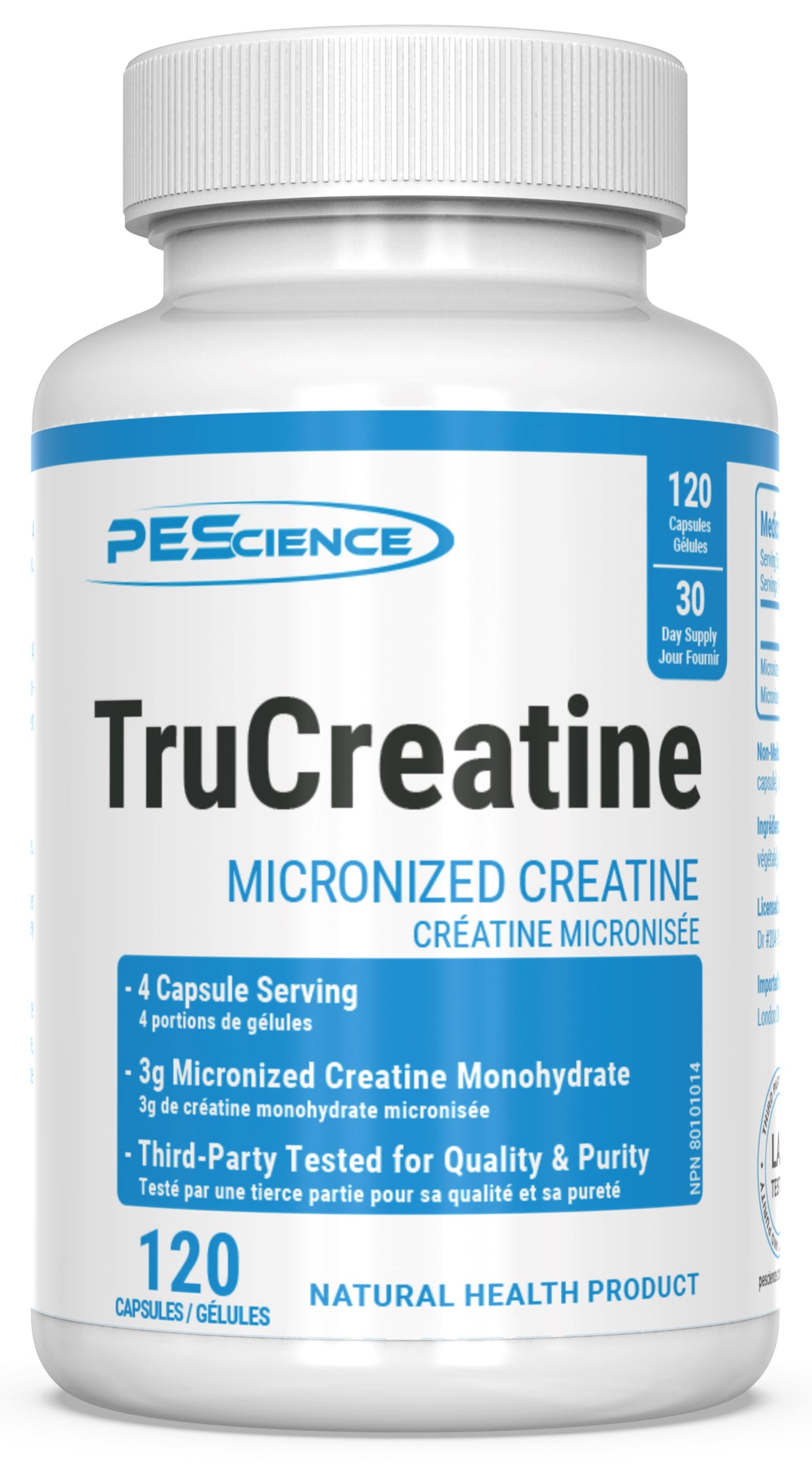
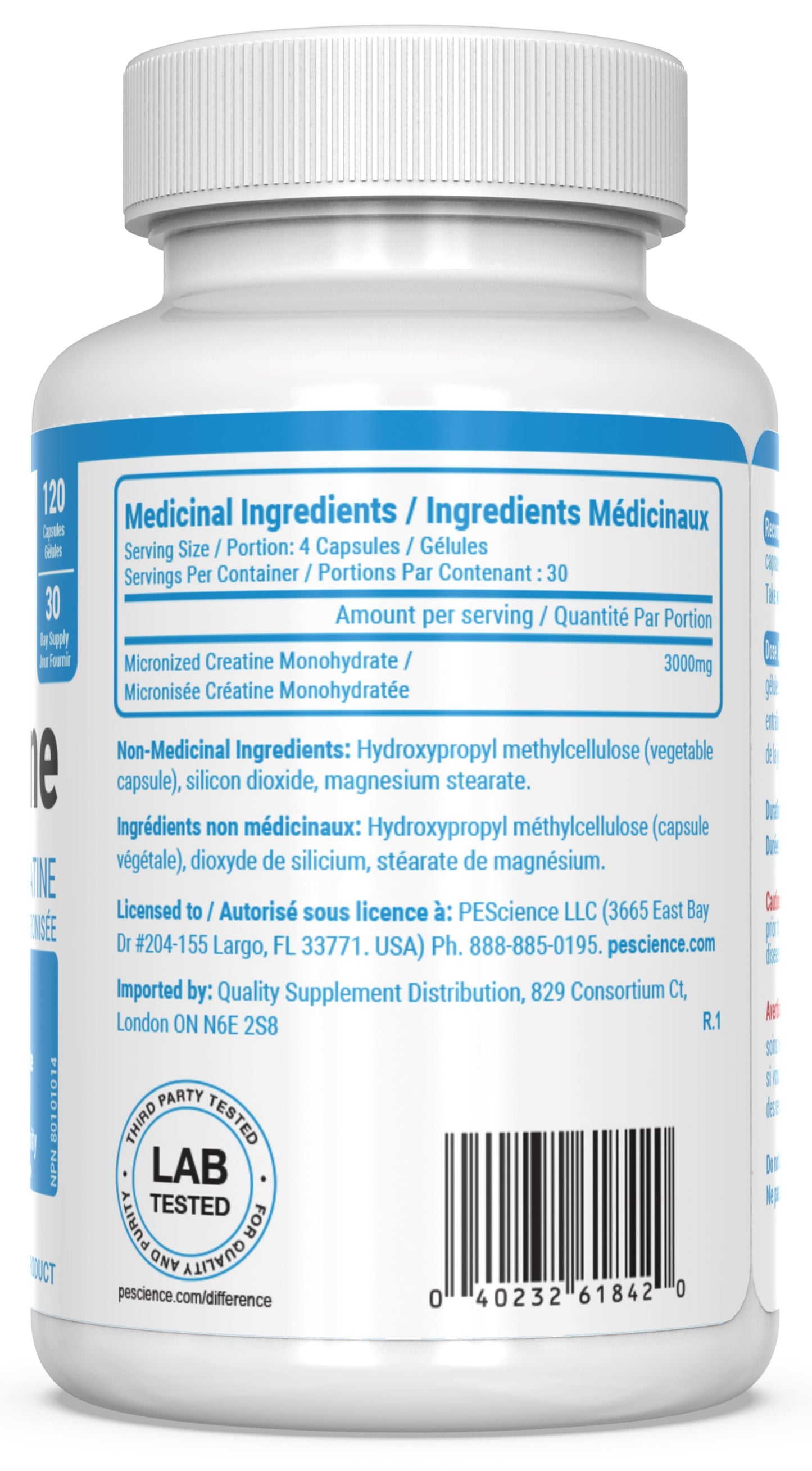
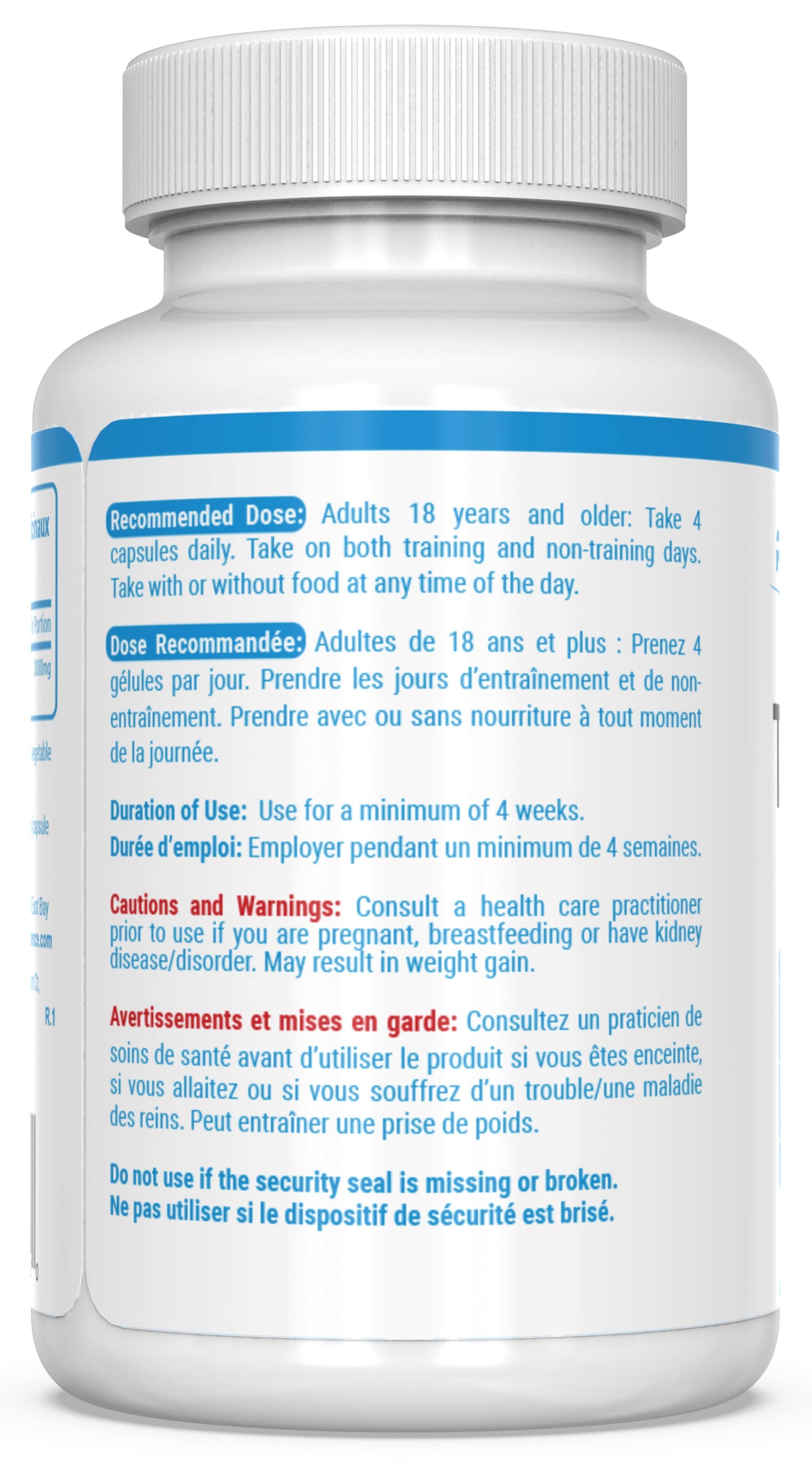
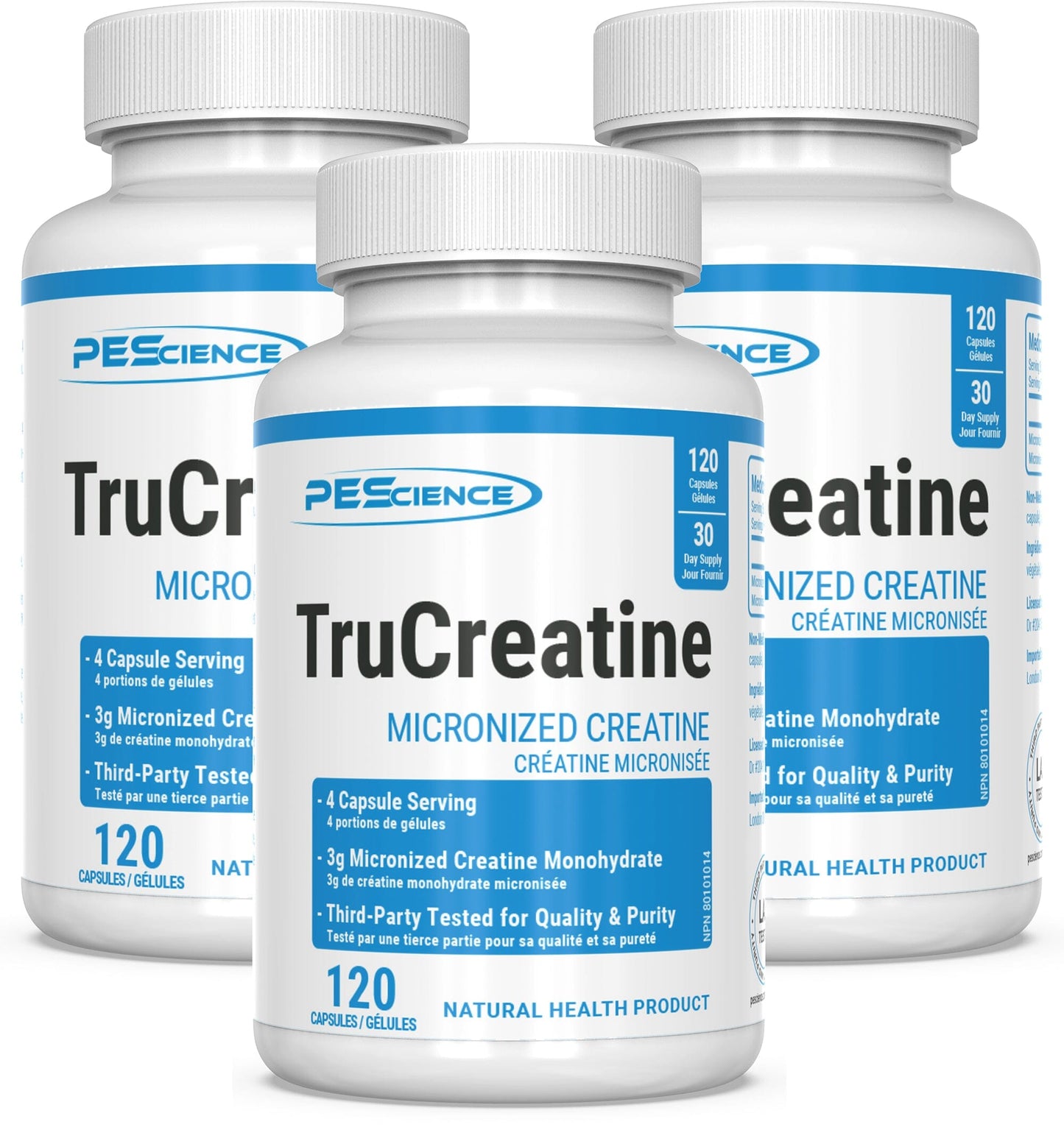
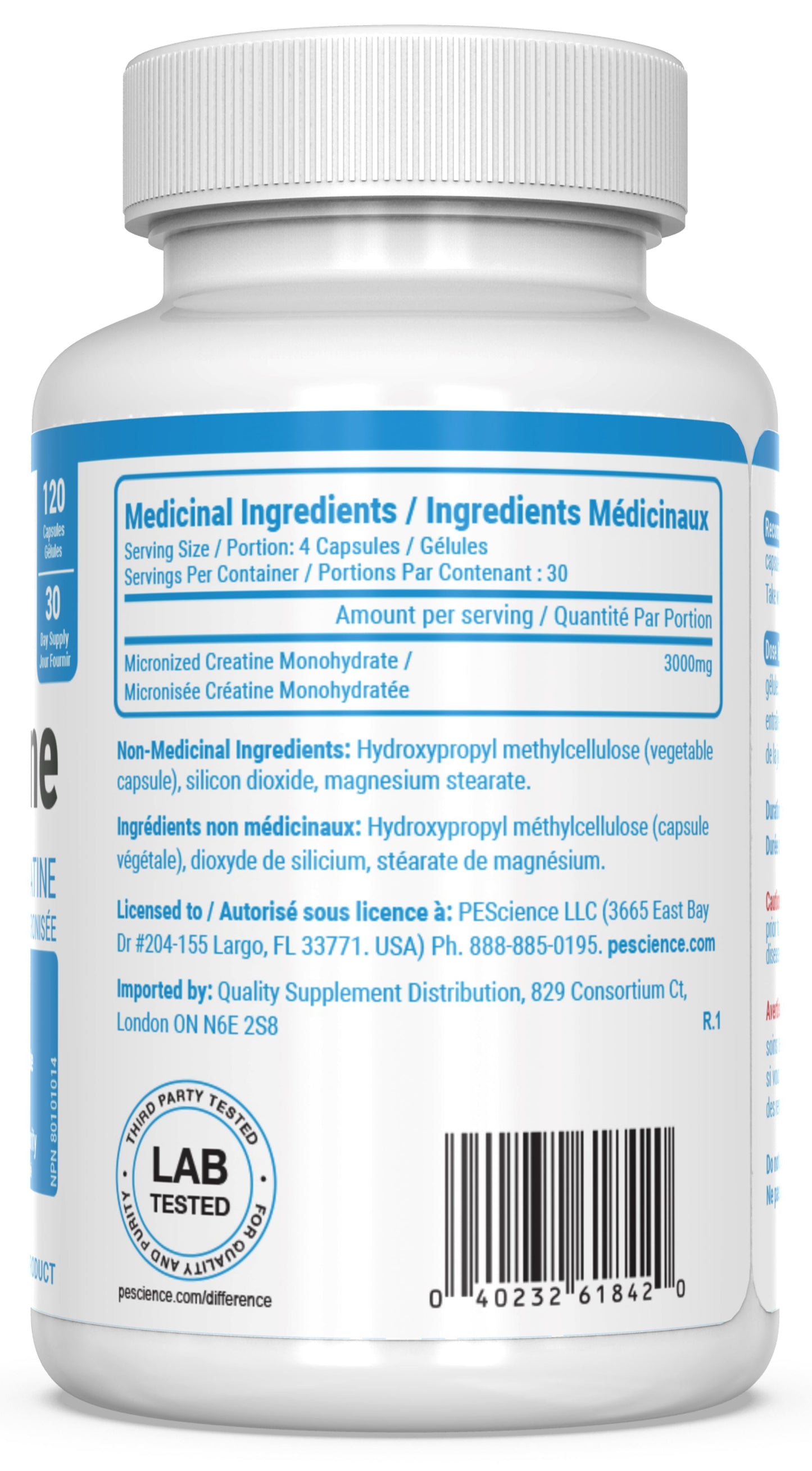
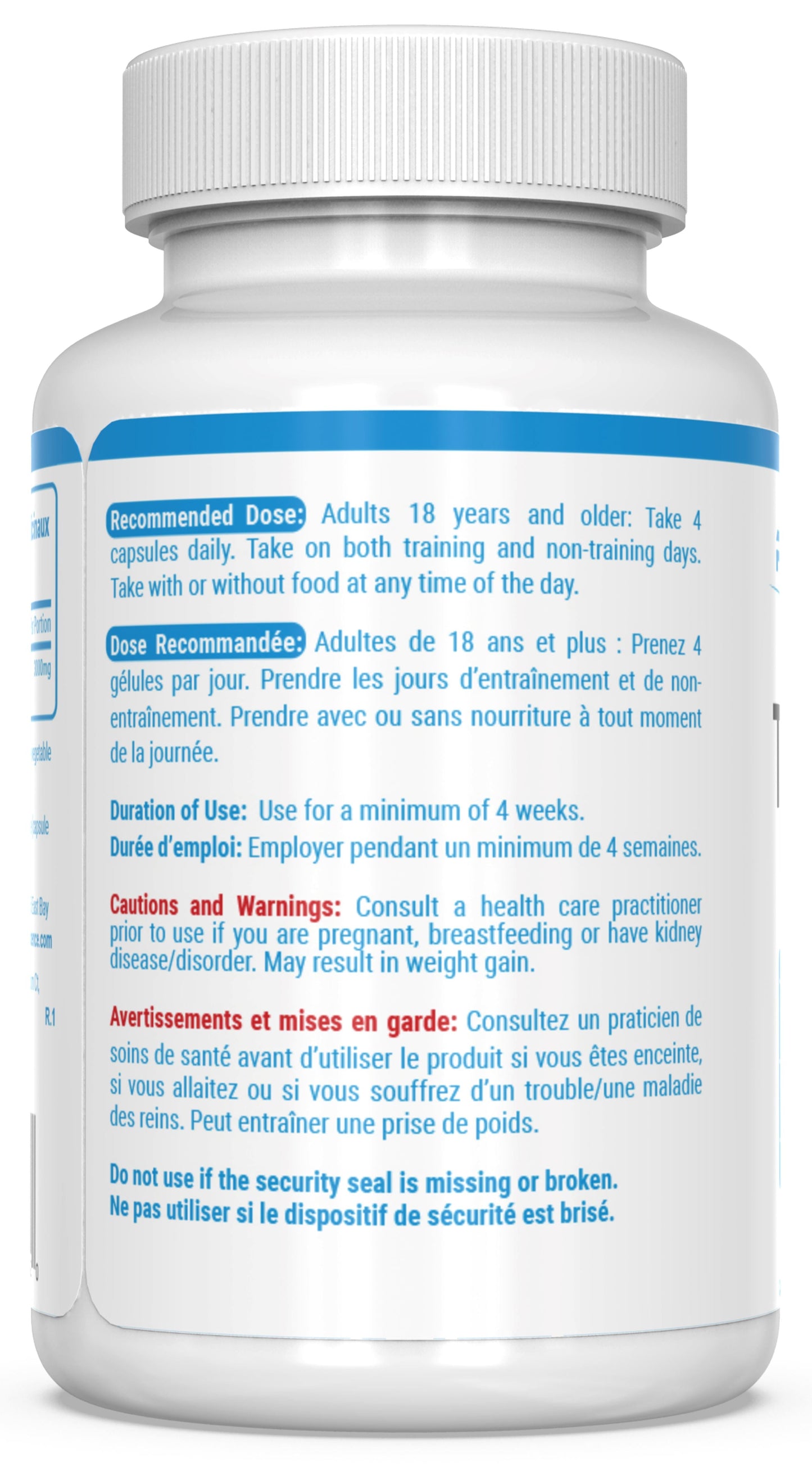
Key Features
-
Increase Power
Creatine is among the most well-researched & effective supplements. It can help with strength & exercise performance by rapidly producing cellular energy during intense activity.
-
Increase Stamina
On top of increasing strength and performance, creatine has the ability to reduce muscular fatigue. This in turn can further benefit performance by allowing longer, harder training in any type of physical training.
-
Muscle Size
Having better workouts obviously results in better muscular development. But creatine also allows muscle to store more water, which is a positive thing for anyone looking for a more muscular appearance. Read more below about the misconceptions of creatine.

How Creatine Works
When muscles are being used, their main energy source in the body is known as ATP (adenosine triphosphate). When the ATP is used up, it turns into ADP (adenosine diphosphate), and can no longer be used for energy.
Creatine is naturally produced in the body from amino acids. It stores high-energy phosphate (P) groups and can turn the useless ADP back into ATP, the primary energy source for working muscles.
Creatine can be found in some foods and is most prevalent in meat and fish. But you can get a controllable serving of creatine every day with TruCreatine.
Creatine Misconceptions:
-
Does creatine make you bloated?
Creatine does not make you bloated. This misconception started from an oversimplification of how creatine works. Creatine does in fact make you retain more water, in your muscle tissue! This is exactly what anyone who is looking for a more muscular appearance wants. The misconception comes from people falsely assuming this water storage occurs in places like fat tissue, like traditional bloating, which is not true.
-
Do I need to "load" creatine?
Short answer: No. Creatine loading is where a high dose of creatine is taken for the first 5-7 days, typically 20g/day, and after the 7th day, taking just 3-5g per day going forward. Doing a loading phase does help you reach saturation level in a slightly shorter period of time, but it is not necessary and we do not recommend it. What's important, is taking creatine every day, not just on training days.
-
Is creatine only for bulking?
Creatine can be used by anyone wanting to increase strength, grow muscle, or maintain muscle mass. Regardless of your goals, if musclar performance or development is important to you, creatine should be part of your daily ritual.
Contenu réductible
Supplement Facts
Quality & Purity Testing
All of our raw materials are tested for purity prior to being used in our manufacturing. After manufacturing is complete, another round third-party testing occurs on the finished product before it is released for sale.
Ask a Question
Technical Product Writeup
For the past 20 years creatine has been one of the most widely used supplements in the world by athletes and fitness enthusiasts, and for good reason. Creatine works! Its positive impact on resistance training, performance, power, strength, and muscle mass is just the tip of the iceberg for creatine supplementation. That’s why we sell TruCreatine.
As with all things that become popular, misconceptions and myths spread around the internet and throughout gyms, fogging the facts of creatine. Thankfully, an amazing group of researchers took the time, expertise, and combined efforts to perform a proper review of the 500+ peer-reviewed studies on creatine and aggregate all the facts, while separating out the myths.
In this article we are summarizing their review to deliver what we feel are the most important facts and myths our customers frequently ask us about. The review has tons of additional information and benefits of creatine unrelated to fitness should your curiosity become sparked. If you’d like to read it in its entirety visit this link: Common questions and misconceptions about creatine supplementation: what does the scientific evidence really show?
Note: Any time we are talking about creatine, we are talking about creatine monohydrate, the form used in TruCreatine+.
Misconception: Creatine makes you bloated
False. Creatine does not make you bloated.
This is by far the misconception we see thrown around the most. The seeds of the misconception were planted in the early days of creatine supplementation, back in 1985, when one researcher noted an increase in "total body water" in subjects who took 20g of creatine for 6 days.
Decades later, we now understand how creatine works. First, a dose of 20g is unnecessary (more on that later). Second, later studies have shown that when taking a standard dose of 5g creatine, and measuring total body water after 6 weeks, no increase is noted.
In the few instances where creatine has been correlated to a short term (less than 1 week) increase in total body water, what researchers have found is this water increase is intracellular in muscle cells, not extracellular in fat tissue. Layman's terms, the temporary increase in water that some people notice is inside your muscles tissue, making them appear bigger, not in your fat tissue, which some refer to as “water bloating”.
Straight from the source, the researcher’s summary below:
In summary, while there is some evidence to suggest that creatine supplementation increases water retention, primarily attributed to increases in intracellular volume, over the short term, there are several other studies suggesting it does not alter total body water (intra or extracellular) relative to muscle mass over longer periods of time. As a result, creatine supplementation may not lead to water retention.
Do I need to do a creatine loading-phase?
Short answer: no. Can you? Sure.
Creatine loading is where a high dose of creatine is taken for the first 5-7 days, typically 20g (5g 4 times daily), and after the 7th day, taking just 3-5g per day going forward.
In order for creatine to have maximum benefit, it must reach “saturation level” in your body. Doing a loading phase does help you reach this saturation level in a shorter period of time, however, skipping the loading phase is perfectly OK too, and you will still achieve maximum saturation, and you’ll save yourself some money in the process.
What is important, is taking creatine every day, not just on training days. A word of caution for those who decide to do a creatine loading phase, the most common issue is GI-distress, so we suggest skipping the loading, and just go with 3-5g per day every day.
When should I take my creatine?
Creatine supplementation is the easiest. Just take it every day, even on non-training days. The specific time during the day is not important. Remember, creatine is something that builds up in your body until saturation is reached, and then your daily ongoing use keeps the saturation.
Is creatine only for men?
Creatine is not just for the bros. Creatine is effective for the ladies as well. In fact, it has been researched in women throughout all stages of life from late teens to post-menopausal, showing its ability to increase muscle mass and physical strength, just like in men.
Does creatine make you gain fat?
No.
In a recent review and meta-analysis of 19 studies, covering over 600 subjects who combined creatine with resistance training, subjects taking creatine had a greater reduction in body fat percentage (average loss of ~1 lb). While this value was not statistically significant, it definitely rules out any chance of creatine causing fat gain.
Is creatine safe?
Creatine has been subject to over 500 studies, some covering up to 3 years of chronic use. When used properly (3-5g/day), healthy individuals can take creatine year-round, for years. Being one of the most researched ingredients in the world has created an enormous body of evidence supporting creatine’s safety.
More recent studies are even finding creatine to be a pro-health supplement, now finding use in the anti-aging field.
Are alternate forms of creatine better than creatine monohydrate?
While less popular now, there was a time when companies started selling alternate forms of creatine touted as being better than creatine monohydrate (standard creatine). Some even carried ridiculous claims like, “creatine that doesn’t bloat!”, which as you now know, was a myth to begin with.
In a 2021 study, researchers sought out to review all the studies on alternative forms of creatine. Of those that exist, only three had studies done comparing an alternative form of creatine to creatine monohydrate. The results? There were no consistent findings of performance enhancement among alternative forms of creatine when compared to placebo.
We hope you learned something new!
Want new product notifications?
Be the first to know.






